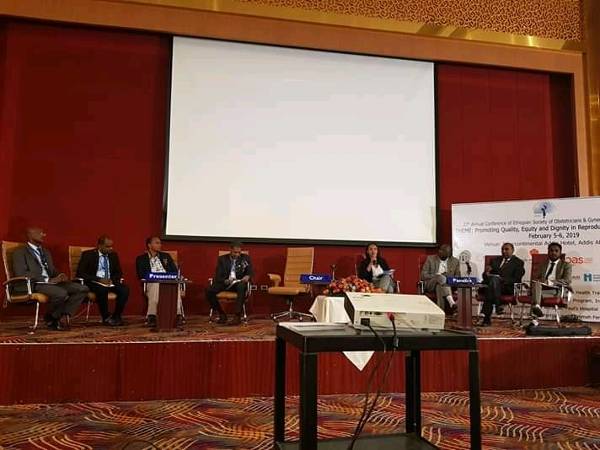Melese Takele discusses PAESOE issues at the Annual ESOG Conference
PAESOE President, Mr. Melese Takele was invited as a panelist at the 27th Annual Conference of the Ethiopian Society of Obstetricians and Gynecologists (ESOG) and shared his thoughts on the role of IESOs and PAESOE in improving universal access to Primary Health Care and the safety of obstetric practice. A summary of his comments at the conference are presented here.

Contents
- How does PAESOE see the challenges faced with universal access to Primary Health Care and the safety of Obstetric practice?
- Proposals on maintaining quality of obstetric care and the way forward in Primary Health Care
How does PAESOE see the challenges faced with universal access to Primary Health Care and the safety of Obstetric practice?
Primary Health Care (PHC) is essential health care made universally accessible to every individual. It must be acceptable to the community and is implemented with the full participation of the community. It has to be delivered at a cost that the community and country can afford.
Primary Health Care is the first point of contact within a multi-tier healthcare system and is available at community, health center and primary hospital levels.
The majority of primary health care for surgery and obstetrics is provided by integrated emergency surgical officer (IESO) professionals at these centres. Therefore, any discussion regarding improving universal access to PHC and safety of obstetric practice has to addresss the role or performance of existing as well as new IESOs.
Universal access to PHC, particularly reproductive health services, is an important goal of every country around the world. Ethiopia is one of the countries striving to achieve the Sustainable Development Goals set by United Nations by improving access to emergency obstetric care and life saving surgical services to the most vulnerable communities. Over the past few years, Ethiopian MoH has implemented many activities including constructing new health facilities, availing basic supplies and producing/introducing new task force including Health Extension Workers to address health extension packages and IESOs to increase the access to emergency obstetric and surgical services).
Achievements of IESOs and PAESOE
We now have over 730 IESOs who have graduated from 11 universities and have been posted to most rural hospitals to improve access and quality of PHC. The deployment of these professionals has resulted in significant changes on the accessibility/quality of emergency obstetric and surgical care that is available to communities who are in need.
In just 5-7 years since deployment of IESOs, maternal mortality rate in Ethiopia has dropped from 676 per 100,000 births in 2011 (2011 EDHS report) to 353 per 100,000 (MoH report).
Since it’s establishment, PAESOE has been enganged in various activities to further support and improve the good work already being done by our member IESOs. These include:
- working closely to address IESO’s issues
- liasing with MOH and other organisations regarding future career development and incentive packages for IESOs
- establishing a standard on IESO’s in private practice and others
- with strong support of Dr. Biku Ghosh and Dr. Vishnu Chandrabalan from UK, we have already created a website (https://paesoe.org) to update our association members and others about the organisation’s activities, upcoming training workshops, as well as provide links to useful elearning resources such as textbooks, journals, videos, guidelines and more.
- We have also been working to facilitate training for IESO professionals (after having strong communication with Prof Staffan from Karolinska Institute-Gotland, course has been moved to Ethiopia, last year given at Bahrdar University).
Challenges
Despite all these achievements, still there are numerous challenges that ESO professionals are facing on the provision of Obstetric and surgical emergency services to community.
- At community level:
- delays and poor health seeking behavior
- poor awareness on the services that are available in near by facilities
- At health facility level:
- shortage of supplies within the facilities
- frequent turnover of professionals from site of deployment ( esp anesthetist)
- no functional blood banks
- poor staff satisfaction due to unsatisfactory incentive packages, poor administration within the hospitals, absence/delay of career progression.
- skills gap due to unavailability of CME program and supportive supervision.
- At higher level (country or global):
- mostly related with financial constraints
- problem of evidence based policy formulation
Recommendations
- strengthen the leadership system
- work to sort out issues that can dissatisfied the staffs
- evidence based policy formulation
- increase the domestic finance to Primary Health Care instead of investing more budget to secondary or teritiary level of care.
- learn from other countries having best experiences
Proposals on maintaining quality of obstetric care and the way forward in Primary Health Care
To maintain the quality of emergency obstetrics and surgical care, PAESOE has planned to do in the future either independently or together with MoH and other societies like ESOG, SSE, and midwife association.
- To have regular and structured CME programme
- Regular audits of key performance indicators to be decided by MOH /ESOG/PAESOE
- Regular morbidity and mortality reports to enable continued improvement (but this should be within a ‘no-blame’ culture).
- Ensure minimum criteria for equipment and staffing are met in all health centres.
- Improve access to elearning resources including training videos, courses so that we can continue improving every day.
- Create distance-learning, online courses in safe obstetric care to support career progression.